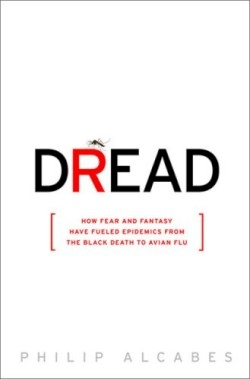Dread
How Fear and Fantasy Have Fueled Epidemics from the Black Death to Avian Flu
The bubonic plague was an archetypical societal experience in Europe. It killed about 200 million people in the fourteenth century. In repeated waves that appeared and disappeared over a four hundred-year period, the so-called pestilence imprinted a fear of strangers, a conviction that the sufferer deserved his or her fate, the idea that the plague was heavenly vengeance, and the suspicion that those of a different religion, particularly Jews, were to blame. “[T]he plague was a cataclysm on which people piled meanings: treachery, foreignness, sanctity and faithlessness, dying for ones religion, obeying (or rebelling against) authority, and, of course, the fecklessness of nature. It acquired more layers of metaphor over time” Since then, Western cultures have reacted to outbreaks of deadly diseases with those concepts in mind.
For example, in the twentieth and twenty-first centuries, earlier prejudices have tainted our treatment of the victims of AIDS, SARS, avian flu, and drug-resistant tuberculosis. Fears of sin, homosexual and non-monogamous sex, and IV drugs have perverted the publics perception of the risks and the victims of HIV and AIDS, and delayed proper funding and research into the virus and effective treatment. In 2005, the mass media hyped the potential spread of flu H5N1, or avian flu, a disease that has killed millions of birds but only 248 humans. The great fear was that the flu would mutate to pass more easily from bird to human and between humans. Internationally, governments stockpiled Tamiflu and individuals demanded prescriptions to combat that possibility, which did not come to pass.
Alcabes is an associate professor at the City University of New Yorks Hunter College campus and has been published extensively in medical journals on public health issues and the social aspects of HIV/AIDS and tuberculosis. In his absorbing book, Alcabes identifies other health problems, like obesity and autism, that arent germ-based, yet are defined as epidemics. They vie for the attention and funding due a new bubonic plague. But fear is not science, and despite hyperbolic language attached to “good” behavior, life is not without risk.
Reviewed by
Deirdre Sinnott
Disclosure: This article is not an endorsement, but a review. The publisher of this book provided free copies of the book to have their book reviewed by a professional reviewer. No fee was paid by the publisher for this review. Foreword Reviews only recommends books that we love. Foreword Magazine, Inc. is disclosing this in accordance with the Federal Trade Commission’s 16 CFR, Part 255.

